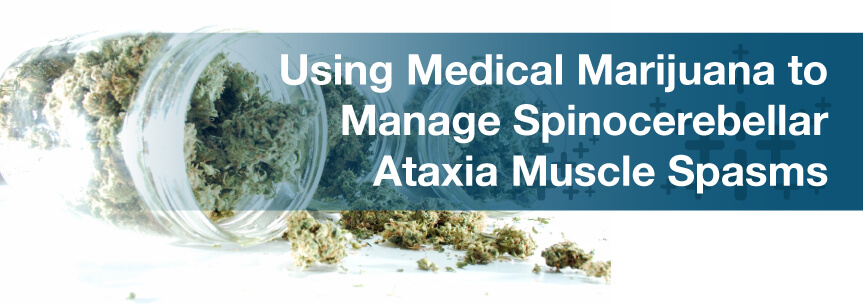
Spinocerebellar ataxia (SCA) is a disease that causes the cells in your cerebellum to degenerate. Since the cerebellum controls muscle coordination, SCA affects your ability to control your muscles. In addition to symptoms like uncoordinated movement and vision problems, SCA can cause muscle spasms.
These muscle spasms can range from occasional, minor cramps to constant, debilitating episodes. Since SCA is a progressive condition, the symptoms can get worse over time. So, even if you don’t have severe muscle spasms right now, you could have them at a further stage of your SCA. Today, many patients use cannabis medicine to relieve muscle spasms related to a variety of conditions, including SCA.
While muscle spasms have many traits in common regardless of their causes, knowing what causes them can help you treat them effectively. Sometimes, they come from physical strain on your muscles, but other times they can come from damage to your central nervous system.
The spasms you get from SCA happen because of the damage your cerebellum receives. When your cerebellum sends the wrong signals to your muscles, they become tight and susceptible to cramping. We call this symptom spasticity.
SCA and spasticity have no cure. So, doctors instead focus on reducing symptoms and improving the patient’s quality of life. They aim to increase the patient’s functioning and lower pain. Since SCA and spasticity impact everyone differently, each person’s treatment plan will be unique. Possible treatment approaches for spasticity and SCA include:
Both spasticity and SCA happen as symptoms of underlying conditions. So, folks who have these issues usually get additional treatments.
Conventional treatments for spasticity don’t always work effectively. Some of them, such as prescription painkillers and muscle relaxants, have harsh side effects or shouldn’t be used over the long-term. But, using the other therapies and medications doesn’t always do enough for patients. When symptoms become severe, they need something safe to get the job done.
So, more patients are using cannabis medicine to treat their SCA-related spasticity. It both relaxes muscles and reduces pain. Muscle tightness and pain both reduce your mobility and function, so it can help you complete more daily living activities. Plus, it has much milder side effects, like extra hunger and dizziness.
Medical marijuana contains numerous compounds called cannabinoids. Most research on cannabinoids’ health benefits focuses on tetrahydrocannabinol (THC) and cannabidiol (CBD), which work together to relieve spasticity symptoms. They both reduce pain and relax muscles, and THC adds anti-inflammatory benefits.
Since both major components of marijuana tackle the main symptoms of SCA-related spasms, you have a wide variety of medication to choose from. You can even select the amount of THC and CBD in your medicine to get the effects you want. THC causes the psychoactive effects associated with cannabis, so you can opt for CBD-only medication to avoid the “high.” When in doubt, talk to your dispensary staff to see how each medication impacts users.
Getting the right marijuana medication is a group effort. Doctors certified to recommend medical marijuana can write recommendations and advise you on a treatment plan, and the budtenders at your local dispensary receive training to help you choose the right product for your symptoms. Find both by searching our database of approved physicians and dispensaries near you.